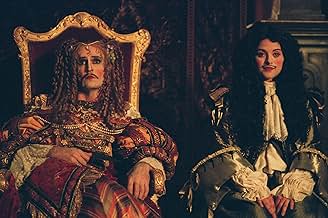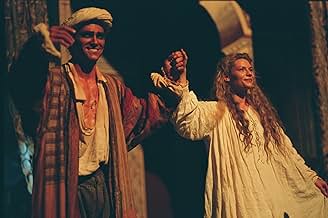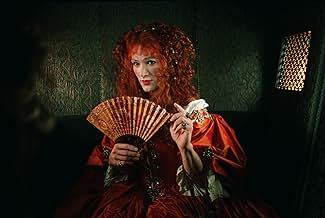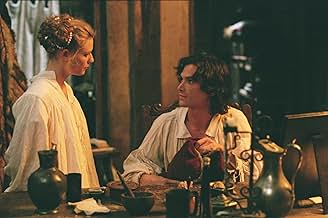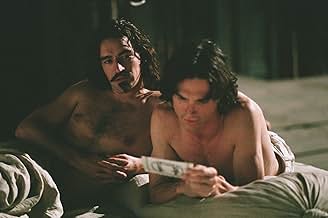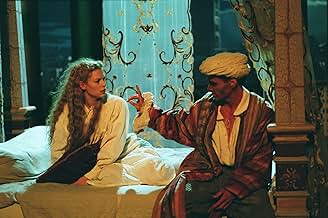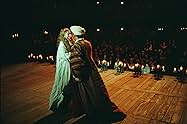Ajouter une intrigue dans votre langueA female theatre dresser creates a stir and sparks a revolution in seventeenth century London theatre by playing Desdemona in Othello. But what will become of the male actor she once worked ... Tout lireA female theatre dresser creates a stir and sparks a revolution in seventeenth century London theatre by playing Desdemona in Othello. But what will become of the male actor she once worked for and eventually replaced?A female theatre dresser creates a stir and sparks a revolution in seventeenth century London theatre by playing Desdemona in Othello. But what will become of the male actor she once worked for and eventually replaced?
- Réalisation
- Scénario
- Casting principal
- Récompenses
- 4 victoires et 1 nomination au total
Avis à la une
It tells the tale of Ned (Billy Crudup), a young actor who specialises in portraying women on stage. In a world where only men are allowed to tread the boards, Ned's "Desdemona" (from Shakespeare's Othello) is the closest thing 17th century audiences get to femininity in theatre. However, a young upstart in the form of Maria (played by Clare Danes) wants to change all that. She has a passion for drama and unfortunately the bisexual Ned. With the help of King Charles II (Rupert Everett), she may just get her wish, changing theatre forever, and hopefully pick up Ned on the way.
When thinking of the themes of the film, many people dismiss it as a clone of Shakespeare in Love. This is unfair- the film is more thought provoking, substantial and better acted than the aforementioned Oscar snaffler. It explores themes of sexuality and gender with insight and intelligence as well as telling (and, in fact enthralling us with) a love story. As previously referred to, the acting is exceptional, especially the two leads (Danes and Crudup) who shine. The supporting cast is strong too, with Richard Griffiths as a heterosexual prequel to his role in Withnail and I, Tom Wilkinson brimming with quiet intensity as Betterton and Everett hamming it up wonderfully as the King.
Even if it does end on a slightly trite note (not to give too much away, but its' "birth of method acting" shtick irritates), Stage Beauty is a funny, heart-warming and occasionally quite cerebral meditation on love and art. What more could any theatre, or film lover for that matter, want? And don't say Shakespeare In Love!
Don't expect an elegant historical romp from Stage Beauty; it's much more than that. Director Richard Eyre (Iris) and screenwriter Jeffrey Hatcher have loosely interpreted true events to deliver a passionate, romantic journey of gender-bending self-realisation set in the bawdy world of the British Restoration, circa 1660.
In a time when women are banned from acting on stage, King Charles II is on the throne, accompanied everywhere by his vulgar but merry mistress, Nell Gwnn. Meanwhile Ned Kynaston (Billy Crudup) is the most celebrated leading lady of his time. He is adored by his audiences, by his lover and patron the Duke of Buckingham, and secretly loved by his dresser Maria (Claire Danes). But when aspiring actress Maria's illegal performance as Desdemona in Othello triggers royal permission for women to act on stage, Kynaston's fall from grace is swift.
This is an actors' film, where the talents of Danes and in particular, Crudup, shine. (Their remarkable relationship triggered an off-screen romance.) Crudup is taut as the bisexual Kynaston, trained to be a calamity and actress since early adolescence, and emotes powerfully as he struggles with his sexuality and identity in an unfriendly new political landscape. He is alternately a catty drag queen, angry young man and committed thespian, without ever straying beyond credibility. In contrast, Danes is luminous but unsure as Maria. A talented supporting cast includes Rupert Everett, providing comic relief as the languid King, while Ben Chaplin is sensual as the self-serving Duke.
Stage Beauty has been compared to Shakespeare in Love, but although it's less successful, it's far less contrived. Although Stage Beauty is a love story, you don't know how things will resolve. The pace is less brisk than in a more manufactured film, but it's also more realistic, enhanced by production design and costuming which depicts both the grit and the sumptuousness of the time.
While at first the on stage acting grates, it is deliberate. As Stage Beauty progresses, the acting technique evolves to resemble 19th Century Naturalism not true to life, but faithful to the emotional journey of the characters. It's a special film that will take you on an emotional journey too.
**** out of ***** stars.
I agree that Claire Danes acted well (though the hyperventilation happened once too often) and Billy Crudup brought a complexity to the role that I rarely see in films. The reference to Shakespeare in Love is an affectionate comparison: I enjoyed the light snack of Gwinny, luvvies and Fiennes and have sat through the DVD time and again. But that film had a predictability that Stage Beauty lacked. We didn't know that Stage Beauty's 'love element' would ever work out.
I do not see the development of the relationship between Danes and Crudup as a conversion from gay to straight. Instead I see a problematic progress from an imposed gender identity (perpetuated through sexual fantasy by Buckingham) to an un"knowing" but more satisfying state, where it's being yourself (whatever that is) not performing a role that counts. I think that this is relevant to all of us as we perform the roles that we and those who've influenced our upbringing have created for ourselves. We can't easily escape them (and some are more hammy than others in their performance) but the knowledge that life is performative and complex is, for me, liberating.
And all that from a costume drama!
This movie gives us a glimpse of how theatre functioned in England up to the times of Charles II. The female roles of all plays were portrayed by male actors. The school of acting in that era was an artificial one where actors relied in gestures and affectations that would be laughable today in a serious drama, but that was the way it was the accepted Method then, nothing to do with Stanivslaski, or Strassberg.
The leading figure of that theatrical world was Ned Keynaston, who was the most famous Desdemona of his time. There must have been a lot of gay men that were attracted to that world, as was the case with Mr. Keynaston, who might have been bisexual, although that comes as a secondary subplot. This actor is greatly admired by all, including the dressing assistant, Maria. This girl loved to be in the theatre, but could not, because only men were allowed. So instead, she goes to a second rate company that puts on plays in a pub and emerges as Margaret Hughes, an actress in her own right who will challenge Keynaston's Desdemona and makes that role, her signature role as well.
Claire Danes, as Maria, or Margaret Hughes, has never been better! She shines as the girl whose ambition is to be on stage. She is wonderful in the part. Ned, played with gusto by Billy Crudup, shows an unexpected range, although he has done theatre extensively. Both of these actors takes us back to London and make us believe that what we are watching.
A glorious English cast behind the two American principals are gathered to play effortlessly the theatrical figures of the time, and also the King and his court. Ruper Everett, as King Charles II, is hilarious. The scene in which he plays in drag with his mistress, Nell Gwynn, is one of the best things of the movie. Also, Richard Griffith, as lecherous Sir Charles Sedley, gives a stellar performance. Ben Chaplin, as the Duke of Buckingham, reveals the ambiguity of the men that were attracted to those early thespians.
Thoroughly enjoyable because of Richard Eyre's direction and eye for detail.
The topic is more or less familiar from "Shakespeare in love": It is the drama of this time when women wanted to act on stage but only men were allowed to do so. While "Shakespeare in love" showed this drama from a female point of view, "Stage Beauty" deals with a man whose life falls to bits and peaces when a woman plays a woman and achieves a change of law which now allows women to act on stage.
Ned Kinaston (Billy Crudup) is a stage beauty, means: A male actor who is skilled in and specialized on strictly performing female roles. He had done so for years, can do it like no other and play nothing else. He is a star and the best stage beauty in London. Like every star, Ned has someone who cares for him, knows all his wishes on and behind the stage and holds his feet on earth: It is Maria (Claire Danes), the girl who cares for his wigs, his make-up and his costumes. Maria does not only love Ned, she lives for the theatre and dreams to be on stage herself. One night she "borrows" Ned's costumes and wig and makes her dream illegally come true on a little stage. She is a full success and so sets the wheels in motion: A duke has seen her performance, a duke who has connections to the king and soon the law is changed: Women are allowed to act on stage now. Kinaston sees the end of his career and drowns in despair. But it is Maria again who might save him.
A fascinating tale about men in dresses, women in tights and the theatre in Shakespearean England. But "Stage Beauty" is so much more. It is about two people whose heart belongs to the theatre and who are so deep into it that reality and fiction is sometimes a dangerous mix. It is about a man and a woman who find their way in a time where this way seems not to exist. It is dramatic, sometimes wonderfully romantic and fragile, very entertaining and simply beautiful.
Hands down for Billy Crudup's performance: This beautiful man is not bad as a woman, but basically the film celebrates his male beauty. When he is on stage he's incredible and when he's off stage he's simply hot but also convincing when facing the greatest crisis of his life (in his role I mean). But actually the person carrying the film is a fantastic Claire Danes. Once again she is playing Shakespeare, this time not Julia but Desdemona. She is strong, she is beautiful, she is courageous but also sympathetic. The supporting cast is what every director and viewer can only dream of: It includes Tom Wilkinson, Rupert Everett, Hugh Bonneville and Ben Chaplin.
If you haven't seen this film yet, do so, it's a great experiences. It enchants, it gives your dreams wings, hope and strength. And is great entertainment, too.
Le saviez-vous
- AnecdotesClaire Danes and Billy Crudup became a couple after the filming of this movie. Crudup left his long-time girlfriend Mary-Louise Parker for Danes.
- GaffesNed Kynaston, age 20-something, says that he's been playing women on stage for half his life, since he was a child. But at the royal banquet, the King says that the theatres have only recently reopened after an 18-year shutdown caused by the Puritan takeover.
- Citations
King Charles II: Why shouldn't we have women on stage? After all, the French have been doing it for years.
Sir Edward Hyde: Whenever we're about to do something truly horrible, we always say that the French have been doing it for years.
Meilleurs choix
- How long is Stage Beauty?Alimenté par Alexa
Détails
- Date de sortie
- Pays d’origine
- Sites officiels
- Langue
- Aussi connu sous le nom de
- Compleat Female Stage Beauty
- Lieux de tournage
- Sociétés de production
- Voir plus de crédits d'entreprise sur IMDbPro
Box-office
- Montant brut aux États-Unis et au Canada
- 782 383 $US
- Week-end de sortie aux États-Unis et au Canada
- 38 654 $US
- 10 oct. 2004
- Montant brut mondial
- 2 307 092 $US
- Durée1 heure 46 minutes
- Mixage
- Rapport de forme
- 2.35 : 1



